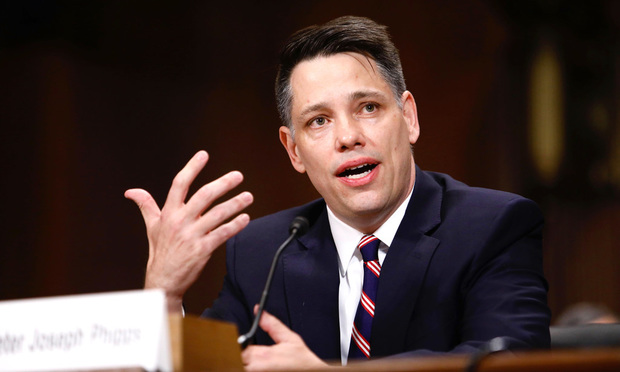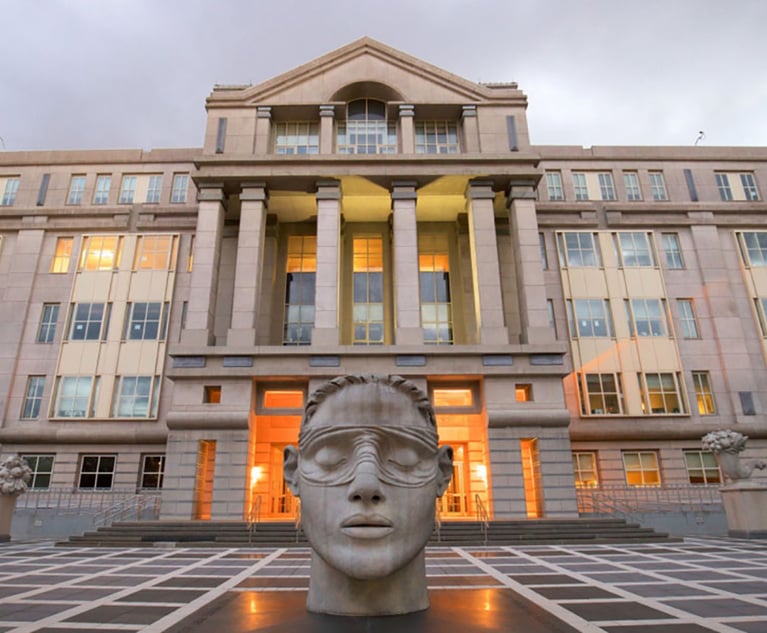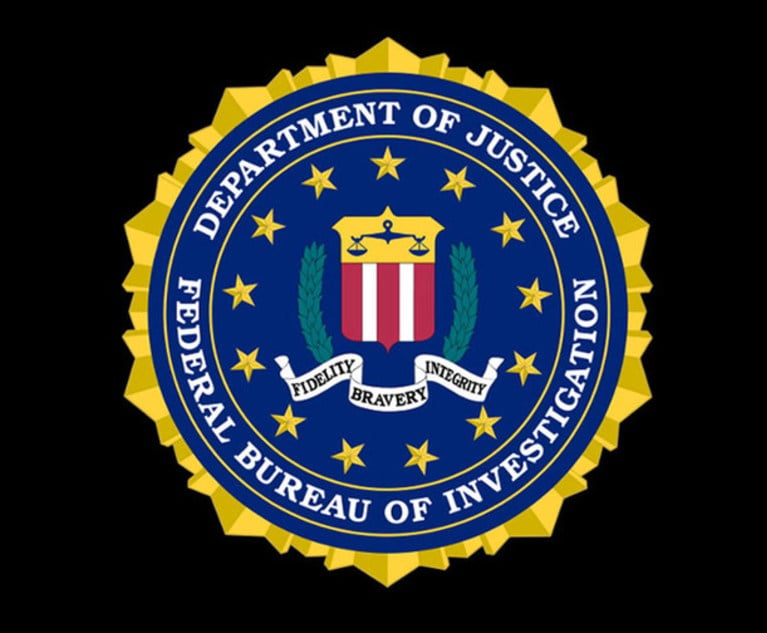Claims of Anti-Catholic Bias Spill Into Former Jones Day Associate's Confirmation Hearing
Republican senators criticized their Democratic colleagues for raising questions about a Third Circuit nominee's membership in the Knights of Columbus.
June 05, 2019 at 04:41 PM
6 minute read
 Peter Phipps testifies before the Senate Judiciary Committee during his confirmation hearing to be a U.S. circuit judge for the U.S. Court of Appeals for the Third Circuit on June 5, 2019. Photo: Diego M. Radzinschi/ALM.
Peter Phipps testifies before the Senate Judiciary Committee during his confirmation hearing to be a U.S. circuit judge for the U.S. Court of Appeals for the Third Circuit on June 5, 2019. Photo: Diego M. Radzinschi/ALM.
Members of the Senate Judiciary Committee on Wednesday battled over the propriety of questioning Peter Phipps, a nominee for the U.S. Court of Appeals for the Third Circuit, about his membership in a Catholic fraternal organization.
Phipps took a seat on the U.S. District Court for the Western District of Pennsylvania only six months ago. Before that, he was senior trial counsel in the federal programs branch at the Justice Department's Civil Division, and spent three years as an associate at Jones Day, where he focused on civil litigation. He got his law degree from Stanford Law School.
In 2015, Phipps argued before the Third Circuit in National Collegiate Athletic Association v. Christie, which concerned New Jersey's 2014 law repealing certain prohibitions on sports gambling. Arguing on behalf of the DOJ, Phipps advocated for enforcing the federal Professional and Amateur Sports Protection Act, which bans states from authorizing sports betting. The appellate court eventually agreed with Phipps and struck down New Jersey's law, finding that it violated PASPA.
The Judiciary Committee heard Phipps' nomination for a Pennsylvania seat on the Third Circuit even though that state's sole Democratic senator, Robert Casey Jr., signaled his disapproval of the nomination by withholding his “blue slip.”
Sen. Chris Coons, D-Delaware, noted that the Third Circuit seat that Phipps was nominated for was vacant because Pennsylvania's Republican senator, Patrick Toomey, had exercised his blue slip privilege to object to an Obama administration nominee, Rebecca Ross Haywood, and President Barack Obama honored Toomey's objection.
Coons told Phipps he and Casey supported Phipps' candidacy for the District Court less than a year ago, but criticized what he said were recent changes to the nomination process.
“I am troubled not by your background or record here frankly but that the administration has decided to nominate you to a circuit court position after less than a year on the bench and over the persistent and vocal opposition of my colleague, your home state senator, Sen. Casey. This is not a comment on you, it's a comment on the vacancy you are filling,” Coons said.
But Sen. Ben Sasse, R-Nebraska, was critical of a written question to Phipps, which inquired about his membership in the Knights of Columbus.
Sasse said such a question was “a new tradition around here, evidently, trying to figure out if people are members of religious organizations. Do you know what the point of the question for the record about your membership in the Knights of Columbus was?”
“No, senator, I do not.”
Phipps, asked by Sasse to describe the Knights of Columbus, said it was founded in the 19th century for charitable purposes such as helping support survivors of men who died in job-related accidents, among other things.
“So, it's much more the stuff of community service, love of neighbor, fish fries and pool parties than some sort of 'Da Vinci Code' stuff? I just want to be clear that I understand this scary organization that you're a member of,” Sasse said.
“That's exactly right. It's a charitable organization. It's an organization that has social and recreational activities that many members of my family have enjoyed and benefited from,” Phipps said.
Sasse said the Knights of Columbus had a history of resisting the Ku Klux Klan and the Nazi Party.
“So let's get a couple of facts for the record so we have them as shared information for the next time a Catholic nominee comes before us. The Knights of Columbus is the largest Catholic fraternal organization in the world. What's happening in this committee is absolutely nuts, that we're asking people questions about why they're members in the largest Catholic fraternal organization in America, and this is becoming common practice in the committee.”
Sen. Patrick Leahy, D-Vermont, who said he was a member of the Knights of Columbus and had experienced anti-Catholic bias firsthand, took issue with the question about Phipps' membership in the group.
“You've got members on your side of the dais who are asking …,” Sasse said.
“Not me, not me, sir,” Leahy cut in.
“You've got people on your side of the aisle wondering if someone who is in the Knights of Columbus should be able to be a judge. I think it would be great off camera for us to huddle and you could ask some of your colleagues some of these questions,” Sasse said to Leahy.
Sen. Sheldon Whitehouse, R-Rhode Island, asked if Phipps understood that his duty is to leave any religious beliefs in the robing room before taking the bench, rather than impose his beliefs on others.
“Senator, that's exactly correct. For me, it's before the robing room. It's when I took that oath. That oath is such a powerful oath and I took it and I follow it,” Phipps said.
“And I think it's fair for people here to test that robing room rule. I don't think we go any further than that,” Whitehouse said.
Later, Sen. Mazie Hirono, D-Hawaii, defended the question about Phipps' membership in the group.
“To be clear, no senator on this side has ever suggested that a member of any organization is per se unfit for the bench. Only those who cannot be fair and impartial,” she said.
Under the Trump administration, the White House and Judiciary Committee Chairman Lindsey Graham have upheld the blue slip tradition for judicial nominees for the federal trial courts, but no at the appeals level, said Carl Tobias, a professor at the University of Richmond School of Law.
He said Phipps “handled the questions well” and his nomination won't face any difficulty, even though he has no real experience with criminal law on the bench or as an attorney and he only served on the district court for six months. Sasse didn't get any traction with his attempt to portray Democrats as anti-Catholic, and Hirono and Whitehouse ably defended the question, according to Tobias.
The committee also held a brief hearing for three District Court nominees: Charles R. Eskridge III, nominated for the Southern District of Texas; William Shaw Stickman IV, for the Western District of Pennsylvania, and Jennifer Philpott Wilson, for the Middle District of Pennsylvania.
This content has been archived. It is available through our partners, LexisNexis® and Bloomberg Law.
To view this content, please continue to their sites.
Not a Lexis Subscriber?
Subscribe Now
Not a Bloomberg Law Subscriber?
Subscribe Now
NOT FOR REPRINT
© 2025 ALM Global, LLC, All Rights Reserved. Request academic re-use from www.copyright.com. All other uses, submit a request to [email protected]. For more information visit Asset & Logo Licensing.
You Might Like
View All
'Younger and Invigorated Bench': Biden's Legacy in New Jersey Federal Court
5 minute read
3rd Circuit Strikes Down NLRB’s Monetary Remedies for Fired Starbucks Workers


As Trafficking, Hate Crimes Rise in NJ, State's Federal Delegation Must Weigh in On New UN Proposal
4 minute readTrending Stories
- 15th Circuit Considers Challenge to Louisiana's Ten Commandments Law
- 2Crocs Accused of Padding Revenue With Channel-Stuffing HEYDUDE Shoes
- 3E-discovery Practitioners Are Racing to Adapt to Social Media’s Evolving Landscape
- 4The Law Firm Disrupted: For Office Policies, Big Law Has Its Ear to the Market, Not to Trump
- 5FTC Finalizes Child Online Privacy Rule Updates, But Ferguson Eyes Further Changes
Who Got The Work
J. Brugh Lower of Gibbons has entered an appearance for industrial equipment supplier Devco Corporation in a pending trademark infringement lawsuit. The suit, accusing the defendant of selling knock-off Graco products, was filed Dec. 18 in New Jersey District Court by Rivkin Radler on behalf of Graco Inc. and Graco Minnesota. The case, assigned to U.S. District Judge Zahid N. Quraishi, is 3:24-cv-11294, Graco Inc. et al v. Devco Corporation.
Who Got The Work
Rebecca Maller-Stein and Kent A. Yalowitz of Arnold & Porter Kaye Scholer have entered their appearances for Hanaco Venture Capital and its executives, Lior Prosor and David Frankel, in a pending securities lawsuit. The action, filed on Dec. 24 in New York Southern District Court by Zell, Aron & Co. on behalf of Goldeneye Advisors, accuses the defendants of negligently and fraudulently managing the plaintiff's $1 million investment. The case, assigned to U.S. District Judge Vernon S. Broderick, is 1:24-cv-09918, Goldeneye Advisors, LLC v. Hanaco Venture Capital, Ltd. et al.
Who Got The Work
Attorneys from A&O Shearman has stepped in as defense counsel for Toronto-Dominion Bank and other defendants in a pending securities class action. The suit, filed Dec. 11 in New York Southern District Court by Bleichmar Fonti & Auld, accuses the defendants of concealing the bank's 'pervasive' deficiencies in regards to its compliance with the Bank Secrecy Act and the quality of its anti-money laundering controls. The case, assigned to U.S. District Judge Arun Subramanian, is 1:24-cv-09445, Gonzalez v. The Toronto-Dominion Bank et al.
Who Got The Work
Crown Castle International, a Pennsylvania company providing shared communications infrastructure, has turned to Luke D. Wolf of Gordon Rees Scully Mansukhani to fend off a pending breach-of-contract lawsuit. The court action, filed Nov. 25 in Michigan Eastern District Court by Hooper Hathaway PC on behalf of The Town Residences LLC, accuses Crown Castle of failing to transfer approximately $30,000 in utility payments from T-Mobile in breach of a roof-top lease and assignment agreement. The case, assigned to U.S. District Judge Susan K. Declercq, is 2:24-cv-13131, The Town Residences LLC v. T-Mobile US, Inc. et al.
Who Got The Work
Wilfred P. Coronato and Daniel M. Schwartz of McCarter & English have stepped in as defense counsel to Electrolux Home Products Inc. in a pending product liability lawsuit. The court action, filed Nov. 26 in New York Eastern District Court by Poulos Lopiccolo PC and Nagel Rice LLP on behalf of David Stern, alleges that the defendant's refrigerators’ drawers and shelving repeatedly break and fall apart within months after purchase. The case, assigned to U.S. District Judge Joan M. Azrack, is 2:24-cv-08204, Stern v. Electrolux Home Products, Inc.
Featured Firms
Law Offices of Gary Martin Hays & Associates, P.C.
(470) 294-1674
Law Offices of Mark E. Salomone
(857) 444-6468
Smith & Hassler
(713) 739-1250






